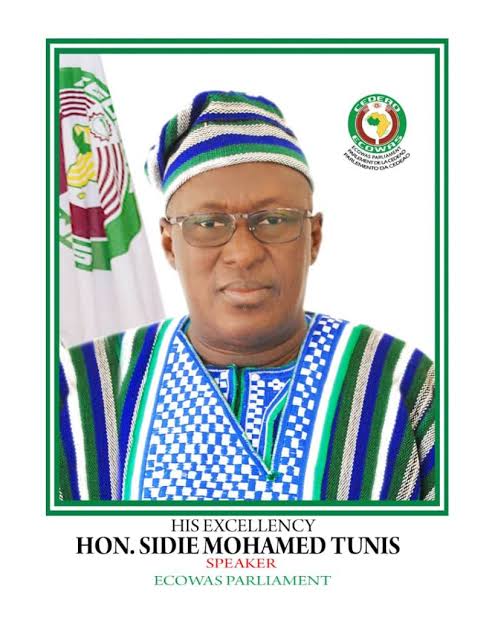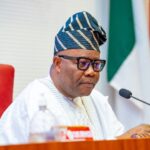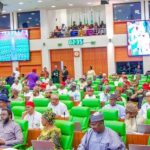By Linus Aleke, Abuja
The outgoing Speaker of the Community Parliament, of the Economic Community of West African States (ECOWAS), Rt. Hon. Sidie Mohammed Tunis, on Wednesday, said that regional solidarity is required in the community’s approach, to guarantee peace and security.

This is as the President of the ECOWAS Court of Justice, Edward Amoako Asante, averred that there is a deficiency in democratic culture in West Africa.
Hon. Tunis said that no country in West African region can be stable without solidarity, stressing that “Our region’s prosperity and safety are inextricably linked to our shared responsibility to look out for one another”.
Speaker Tunis, said this at the official opening of the 2023 ECOWAS Parliament 2nd Ordinary Session holding in Abuja, the Nigerian Capital.
Quoting an African proverb, Hon. Tunis, who flew his family down to Abuja to witness the winding down of his tenure as President of ECOWAS Parliament, said: “Only a foolish neighbour goes to bed when his neighbour’s roof is on fire”.
He further averred that in a region of interconnected threats and challenges, the community can only address its issues effectively through broad,
deep, and sustained cooperation among States.
Such cooperation, the Speaker said, is possible if all countries develop policies that consider not only the needs of their own citizens, but also the needs of others, adding, “this type of collaboration not only benefits everyone’s interests, but also recognizes a shared humanity”.
On global security, Hon. Tunis said that we live in a far from peaceful world today.
He disclosed that in many parts of the world, violence, hatred, and injustice reign supreme, adding that climate change, poverty, hunger, and pandemics are all threats to lives and the planet.
He said: “Millions of people have been forced to flee their homes and seek asylum in other countries. These are not just difficulties for governments and institutions. These are challenges that each of us must face. We must recognize that peace is the foundation of our shared humanity and future. History has shown us that even the most bitter conflicts can be resolved through dialogue and negotiation. I’d like to issue a rallying cry for global peace. Make peace our top priority. Let us work together to make peace a reality. Let us leave a legacy of peace”.
He expressed confident that, with the
mechanisms and institutions in place to prevent and manage conflicts, advance peace and development and foster trade and regional integration, West Africa is on track to achieving its goal of becoming a model of regional
cooperation and integration, not just in Africa, but around the world.
On democracy he said: “In the area of democracy and the rule of law, we must accept the reality that the existence of strong democratic institutions, respect for human rights, and the rule of law ultimately determines security and development. Our democracy can only thrive if we hold each other accountable for our actions. As a result, we must seek out and cherish what unites us as a region and people”.
Speaking on the recently concluded Presidential and Legislative elections in the Republic of Liberia, the Speaker said that Liberia is now a shining example of how far democracy has blossomed in West Africa
He therefore, congratulated the people of Liberia for 20 years of peace and three successful democratic transitions after 14 years of brutal civil war.
“This is the democracy we want for our region. One that binds every future leader to the will of the people. Hopefully, we can learn some good lessons from the people of Liberia and
improve on future elections across the region,” he concluded.
In his goodwill message, the President of the ECOWAS Court of Justice, Edward Amoako Asante, said there is a deficiency in democratic culture in West Africa.
He explained, “this session also comes against the backdrop of a seemingly benign contemporary development in the region’s democratic progression; the military incursions into politics which is a glaring misnomer in the polity. These incursions not only demonstrate a deficiency in our democratic culture but should challenge us to reflect on the trajectory of our democracy and ascertain whether it is imbued with the efficacy and capacity to deliver good governance that satisfy the socio economic needs of our people”.












